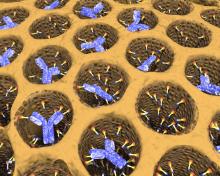The Recombinant Antibody Network (RAN) is a multi-institutional research consortium (member institutions: The University of Toronto, University of California San Francisco and The University of Chicago) created accelerate the identification and development of recombinant antibodies raised against valuable and challenging targets to support drug development and cutting edge biomedical research. The RAN was founded by three ex-Genentech antibody engineers. To date the team has screened and validated over 880 antibodies, some of which are now available for licensing as therapeutics.
OPPORTUNITY
|
Program |
Indication |
Target Activity and Differentiating Features |
Target Affinity |
# Leads |
|
RAN20-1 |
Multiple Myeloma Chronic Lymphocytic Leukemia |
|
NM |
5 |
|
RAN20-2 |
Checkpoint inhibitor (Hematologic Malignancies, Breast, Glioblastoma, Renal Cancers) |
|
NM and Sub NM |
2 |
|
RAN20-3 |
Same as RAN20-2 |
|
Sub NM |
6 |
|
RAN20-4 |
Immune suppressor specific to tumor microenvironment (Leukemia, Glioblastoma, Melanoma, Esophageal, Prostate, Ovarian, Breast Cancers) |
|
NM (with ATP) |
1 |
|
RAN20-5 |
K-Ras Mutations, Pancreatic Cancer |
|
Sub NM |
1 |
COMPETITIVE ADVANTAGE
Phage display synthetic antibody libraries based on fully human frameworks and highly optimized for:
- Good expression profile & high titers
- Ease of production
- Favorable toxicity profiles
Antibodies are extensively validated with a robust set of technical information available with antibody sequences and tangible material:
- Cell binding assays
- Kinetics (SPR)
- Species cross reactivity (ELISA)
- Epitope binning (ELISA)
- HEK production (SDS-Page, SEC)
STATUS
- IP:
- Patent pending
- Stage of Development:
- Preclinical (LI/LO)





